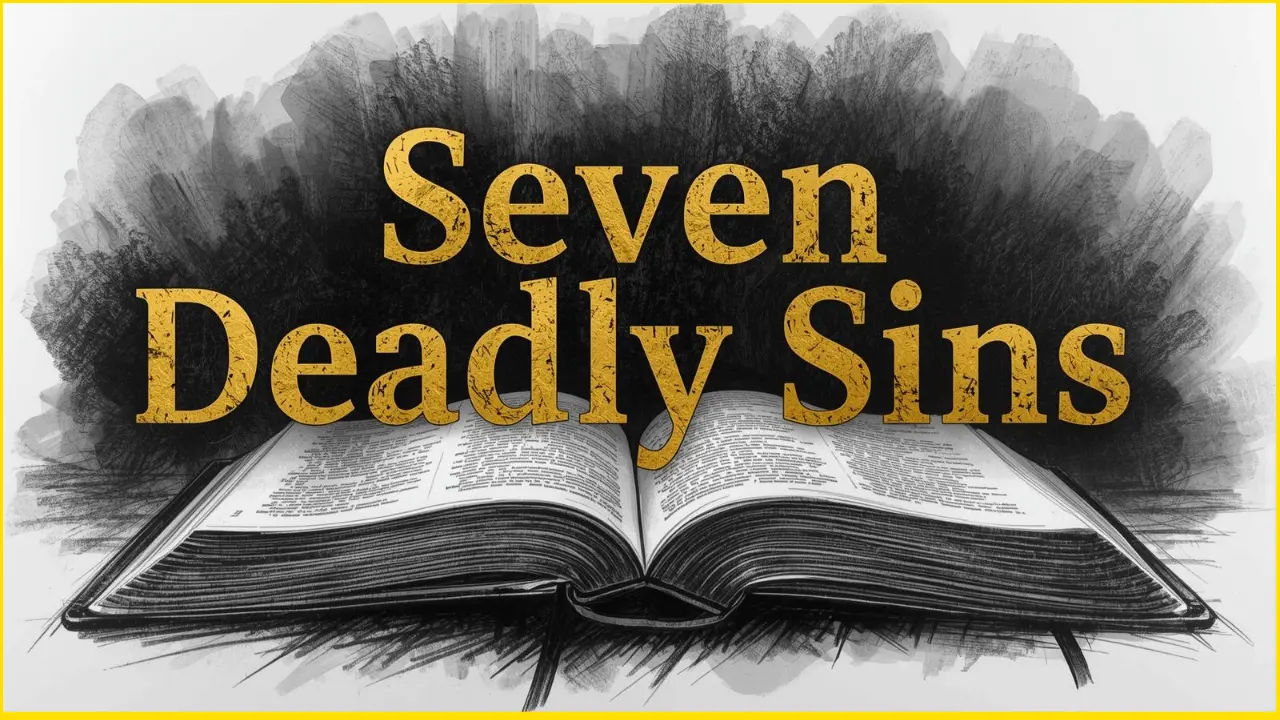The seven deadly sins are seven foundational vices identified in Christian moral teaching. They describe inner attitudes that lead people away from humility, love, and spiritual balance. The seven deadly sins are pride, envy, wrath, sloth, greed, gluttony, and lust. Though not listed together in the Bible, they have been used for centuries to help believers recognize harmful spiritual patterns and seek transformation.
What Are the Seven Deadly Sins?
The seven deadly sins are seven core vices identified in Christian moral teaching. They describe inner attitudes that, when left unchecked, gradually harm the soul and weaken spiritual sensitivity. These sins are pride, envy, wrath, sloth, greed, gluttony, and lust.
Rather than focusing only on outward actions, the seven deadly sins address the heart. They reveal where desire, fear, or self-focus begins to rule over humility, love, and self-control. For centuries, this framework has helped believers examine their inner life honestly and seek renewal through grace.
Also Read:
The Seven Deadly Sins List
- Pride – believing we do not need God
- Envy – resentment toward others’ blessings
- Wrath – destructive and uncontrolled anger
- Sloth – spiritual apathy and avoidance of growth
- Greed – endless desire for more than enough
- Gluttony – excess used as escape
- Lust – desire without moral boundaries
Quick Summary of the 7 Deadly Sins
| Sin | Simple Meaning | Key Bible Reference |
|---|---|---|
| Pride | Believing we do not need God | Proverbs 16:18 |
| Envy | Resenting another’s blessing | Proverbs 14:30 |
| Wrath | Harmful anger that destroys | Ephesians 4:31 |
| Sloth | Avoiding responsibility or spiritual growth | Proverbs 13:4 |
| Greed | Never feeling satisfied with what we have | Luke 12:15 |
| Gluttony | Excess beyond need, driven by escape | Proverbs 23:20–21 |
| Lust | Desire that overpowers peace | Matthew 5:28 |
Ranked: The Seven Deadly Sins from Most to Least Dangerous
Christian tradition often ranks the seven deadly sins by how deeply they influence the heart and give rise to other sins:
- Pride
- Envy
- Wrath
- Sloth
- Greed
- Gluttony
- Lust
This ranking is not about punishment, but about spiritual influence. Sins higher on the list tend to produce multiple other struggles if they remain unexamined. Pride stands at the top because it quietly feeds all the others.
Also Read:
1. Pride — The Root of Every Other Sin

Pride whispers that we know best. It convinces the heart that guidance, correction, and dependence on God are unnecessary. Over time, pride turns attention inward and closes the soul to growth and transformation.
Pride resists humility and thrives on self-justification. It replaces trust in God with confidence in personal opinion and strength.
Bible: “Pride goes before destruction.” — Proverbs 16:18
Modern example:
Rejecting advice, refusing to apologize, or defending a position even after realizing it is wrong.
Spiritual meaning:
Pride builds walls. Humility builds bridges.
2. Envy — The Quiet Poison of Comparison
Envy does not simply desire what someone else has. It feels pain that another person possesses it at all. This comparison slowly steals joy and blinds the heart to its own blessings.
Comparison fuels envy by shifting attention away from gratitude. No achievement can satisfy a heart trapped in constant comparison.
Bible: “Envy rots the bones.” — Proverbs 14:30
Modern example:
Feeling irritated or discouraged when others succeed, marry, travel, or flourish.
Spiritual meaning:
Envy shrinks the soul. Gratitude expands it.
3. Wrath — When Anger Turns Destructive
Anger itself is not always wrong. Healthy anger can protect and correct. Wrath, however, is anger that has lost restraint and purpose. It seeks to wound rather than heal.
When anger hardens into resentment, it eventually spills into words or actions that damage trust and relationships.
Bible: “Let all bitterness, rage, and anger be put away.” — Ephesians 4:31
Modern example:
Exploding emotionally, using insults, or punishing others through silence or withdrawal.
Spiritual meaning:
Wrath breaks what love is trying to build.
4. Sloth — Spiritual Sleepiness, Not Laziness
Sloth is often misunderstood as simple laziness. In reality, it is avoidance of responsibility, purpose, and spiritual growth. Sloth dulls motivation and weakens discipline over time.
It often disguises itself as exhaustion or procrastination, quietly slowing the soul until growth feels overwhelming.
Bible: “The soul of the lazy person desires and has nothing.” — Proverbs 13:4
Modern example:
Ignoring prayer when the heart feels heavy or delaying necessary life changes.
Spiritual meaning:
Sloth slowly disconnects the soul from its calling.
5. Greed — The Endless Hunger for More
Greed is not limited to money. It can involve power, recognition, control, or validation. Greed keeps the heart in a constant state of dissatisfaction.
It convinces the soul that peace will come after the next achievement, promotion, or possession.
Bible: “Life does not consist in the abundance of possessions.” — Luke 12:15
Modern example:
Working endlessly out of fear of losing rather than love of purpose.
Spiritual meaning:
Greed blinds the heart to contentment and trust in God’s provision.
Also Read:
6. Gluttony — Excess That Numbs the Heart
Gluttony is consuming more than needed—food, entertainment, pleasure, or distraction. It is not about appetite alone, but about escape.
Excess becomes harmful when it replaces reflection and healthy coping. Gluttony often hides emotional wounds beneath constant consumption.
Bible: Proverbs 23:20–21 warns against excess and lack of self-control.
Modern example:
Binge-watching, overeating, or constant scrolling to avoid emotional discomfort.
Spiritual meaning:
Gluttony fills the body but empties the spirit.
7. Lust — Desire That Overpowers Peace
Lust is desire without boundaries. It reduces people to objects and prioritizes stimulation over connection.
Over time, lust fragments attention and weakens emotional presence, making genuine intimacy difficult.
Bible: “Anyone who looks with lust commits adultery in the heart.” — Matthew 5:28
Modern example:
Uncontrolled digital temptation or relationships based only on attraction.
Spiritual meaning:
Lust distorts intimacy and weakens purity of heart.
Why Are They Called “Deadly” Sins?
They are called “deadly” not because they are unforgivable, but because they quietly damage what is most alive within us. These sins erode joy, distort love, weaken clarity, and dull spiritual awareness long before visible consequences appear.
Their danger lies in their subtle growth. Left unnoticed, they slowly reshape priorities and desires.
Historical Background

In the 4th century, Evagrius Ponticus identified eight destructive thoughts. In the 6th century, Pope Gregory I refined them into seven categories. Later, Thomas Aquinas gave them theological depth in Summa Theologica.
These thinkers were not inventing new rules. They were naming recurring human struggles and offering language for inner spiritual battles people already experienced.
- Evagrius Ponticus (4th century) identified eight destructive thoughts.
- Pope Gregory I (6th century) refined them into seven categories.
- Thomas Aquinas (13th century) gave them theological depth in Summa Theologica.
- Medieval teachers and artists spread them through Europe.
How the Seven Deadly Sins Show Up in Daily Life
The seven deadly sins rarely appear dramatically. More often, they surface quietly:
- Pride in defensiveness
- Envy in comparison
- Wrath in sharp words
- Sloth in spiritual drifting
- Greed in constant anxiety about “more”
- Gluttony in excess used to avoid emotion
- Lust in seeking validation through desire
Because they feel familiar, they can be difficult to recognize. Awareness is the first step toward change.
Why These Sins Are Called “Deadly”
They are deadly because they harm what is most alive within us:
- joy
- peace
- gratitude
- clarity
- relationships
- purpose
- spiritual sensitivity
These sins drain the soul long before they produce any outward consequences.
The 7 Virtues That Heal the 7 Deadly Sins
| Deadly Sin | Healing Virtue | Meaning |
|---|---|---|
| Pride | Humility | Seeing ourselves honestly before God |
| Envy | Kindness | Celebrating others sincerely |
| Wrath | Patience | Responding gently and thoughtfully |
| Sloth | Diligence | Choosing growth over comfort |
| Greed | Generosity | Giving with joy |
| Gluttony | Temperance | Practicing balance |
| Lust | Chastity | Honoring people as souls |
Spiritual transformation happens when we replace the harmful pattern with its healing opposite.
What Jesus Teaches About These Sins
Jesus consistently addressed the inner attitudes behind behaviour. His teachings emphasize humility, mercy, self-control, and love as the path to freedom.
Rather than shaming, He invited reflection. Change begins when the heart responds honestly to truth and grace.
Are the Seven Deadly Sins Unforgivable?
No.
The seven deadly sins describe human weakness, not permanent condemnation.
Forgiveness restores relationship and renews hope. Growth begins not with perfection, but with repentance and grace.
What the Seven Deadly Sins Teach the Soul
The seven deadly sins are not ancient rules.
They are mirrors.
They show us where the heart struggles, where wounds remain, and where grace is needed.
Each sin reveals a place where the soul feels weak, and each meaning points to a God who restores, strengthens, and renews.
The goal is not perfection.
The goal is transformation—honest, slow, steady, and Spirit-led.
If you want to go deeper, read your repentance-focused guide: 5 Short Prayers of Repentance for Forgiveness Anytime
For deeper exploration of morality and ethics, the Stanford Encyclopedia of Philosophy provides insightful perspectives into human behaviour and values.
Frequently Asked Questions
What are the seven deadly sins in order?
The seven deadly sins are traditionally listed as: pride, greed, wrath, envy, lust, gluttony, and sloth. They are considered the root of many other sins and vices.
Who created the concept of the seven deadly sins?
The concept originated with early Christian monks, particularly Evagrius Ponticus in the 4th century. Later, Pope Gregory I in the 6th century formalized the list into the seven sins we know today.
Why are they called “deadly” sins?
They are called “deadly” because they were believed to endanger the soul and lead to spiritual death if left unrepented. Each sin was seen as a gateway to more destructive behaviors.
Which of the seven deadly sins is considered the worst?
Pride is often regarded as the worst because it is seen as the root of all other sins. Many theological traditions describe pride as the sin that led to Lucifer’s fall from heaven.
Are the seven deadly sins mentioned in the Bible?
No, the Bible never explicitly lists the seven deadly sins. However, passages such as Proverbs 6:16–19 and teachings in the New Testament highlight behaviors closely related to them.

